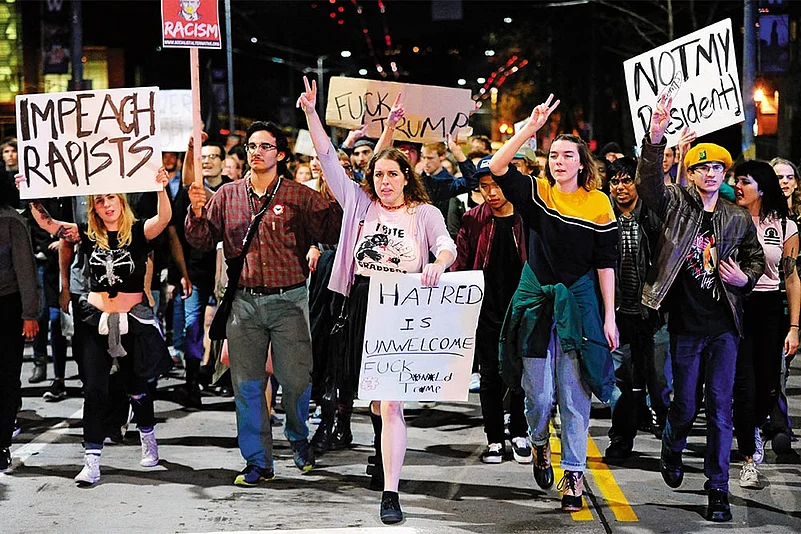It’s 7.30 am. The Ward Villas polling booth on West Adams Boulevard in South Los Angeles is abuzz with voters who have lined up to cast their ballot. Under the shade of a jacaranda tree outside the booth, youngsters huddle together to discuss a straight-out Hillary win. Giovani Ramirez, a first-time voter, sets his skating board down by the sidewalk. “Hillary comes across as someone who’s clearheaded and empathetic,” he says. “Millennials obviously don’t want a president who will be divisive in this polarised political climate.”
West Adams is a Hispanic neighborhood. And Latinos like Ramirez believe Hillary’s path to victory is sealed.
In about an hour, the crowd starts to swell. J. Walker, the resident manager at the polling booth, feels there will be a record turnout this year. He introduces me to a woman who has been voting here for the past three elections. Crystal Cole, an African-American data entry clerk, thinks the political conversation these days is around juggling two evils. “Clinton is more professional and intelligent. At least with her, blacks will not be on the short end of the stick. Multicultural America will vote out Trump,” she says confidently.
The mood is upbeat on November 8 across polling booths, college campuses and cultural centres across Los Angeles. Youngsters sport ‘I Voted’ badges, and older people are decked in blue attire with party accessories. California is bleeding blue.
The sweep of optimism across the city, however, starts dwindling about 8 pm. There’s a trickle of nervousness when results from the East Coast start coming in. The media is apprehensive about the unexpected uptick in Trump’s popularity meter, flashing across lifesize television screens.
“Surely, this won’t be another Brexit. America would have voted wisely,” says Melanie, a sociology student at the University of Southern California.
By 9.30 pm, a hush fills the air across the city as the electoral map of the US slowly starts turning red. Ohio is taken. So is Florida, Arizona, Wisconsin, Pennsylvania.
From sheer impossibility—which was the dominant mood in California about Trump’s ascent—to a distant possibility, people were shocked into silence on the night of November 8 when Donald Trump was voted the President of United States. In a blistering culmination of one of the most polarising campaigns in American history, which took aim at the democratic ideals of the nation, Trump became the 45th President of the US. This victory is bolstered by the fact that Republicans have retained control of the Senate.
While Trump’s supporters indulged in a raucous party to celebrate his victory at the New York Hilton Midtown, his opponents in Los Angeles have gone into mourning.
Joseph, a 26-year-old musician from Puerto Rico, breaks down. “Let’s just say this never happened. It’s inconceivable to even think of him as our president,” he says.
Though late polls predicted a Hillary win, the outcome indicates a battle contested far beyond expectations. “This is a Brexit moment in America. It’s an answer to the changes in culture, a resistance to diversity in the US,” says Robert Shrum, a long-term Democratic strategist in Los Angeles.
In a bitterly polarised country, Trump has the uphill task of bringing voters together. “That will be an insurmountable task for him since he’s always spoken negatively of the minorities—people with disability, sexual and religious minorities,” says Dan Schnur, a former communications director for Senator John McCain in 2000.
From the beginning, this election has been about unpopular candidates and negative favourability ratings, say political analysts. This is demonstrated by the fact that 46.9 per cent of the electorate across the US did not even vote this election. “Voters were distrustful, angry and frustrated. They felt that they were not being heard. If another Democratic nominee had been pitted against Trump, then the race wouldn’t have been so close,” says Tony Strickland, a member of the Republican Party and a former California state Senator.
In response to the results, overnight protests erupted in several parts of Los Angeles, drawing thousands of people. The demonstrators chanted “Epic Fall” and “Trump equals death”. Emma Peplow, a student at University of South California, says, “It’s our responsibility to see why our country is so divided, and we have to find a way to fix it.” Since the results were settled, she has been obsessed with looking at what demographic groups voted for which candidate.
Despite anti-Trump protests in major US cities, the president-elect’s unfiltered rallies and braggadocio have also attracted a zealous following. Mellina Silver, a film and media studies professional, says Trump’s victory is an assertion of American exceptionalism. “He is the key to economic resuscitation and the bolstering of national security,” she says. As far as his anti-women rhetoric goes, Mellina feels, Trump does not have the polish of a politician because he’s a businessman, and therefore does not know how to censor his speeches.
There are others, too, who think Trump’s victory is a victory of his policies. “The inflow of refugees and immigrants will be checked by having a complex vetting system. But at the same time, Trump will help resolve the Syrian refugee crisis by adopting a zero-tolerance-towards-terrorism approach,” says Hernandez, an IT professional.
Young voters speak of late-poll predictions in California. Convinced that Clinton had a persistent edge, they are now sceptical about polls. Bernadine, a psychology student at UCLA, believes that a more realistic approach is vital. “A margin of error can tip the scales in favour of a candidate. It’s now more incumbent upon sociologists than the polling industry to interpret the results.”
Strickland agrees. In the last three election cycles, he says, predictions have been way off. “The results can’t be so inconsistent with the predictions.”
Trump’s victory amounts not just to a rejection of establishment, but also a blow to the legacy of Obama. “It’s a decisive revolt of white middle class and blue-collar voters against multiculturalism,” says Andriana Gonzales, a marketing professional in Los Angeles. In fact, articulating the fear that a lot of Democrats are feeling at the prospect of a Trump presidency, Van Jones from CNN called the election results a “whitelash”.
Trump’s campaign and rallies typified the man who wants America to be great again. Twenty-five per cent of the nation ate from that pie. For the outliers, though, dark days lie ahead.
By Priyadarshini Sen in L.A.

























